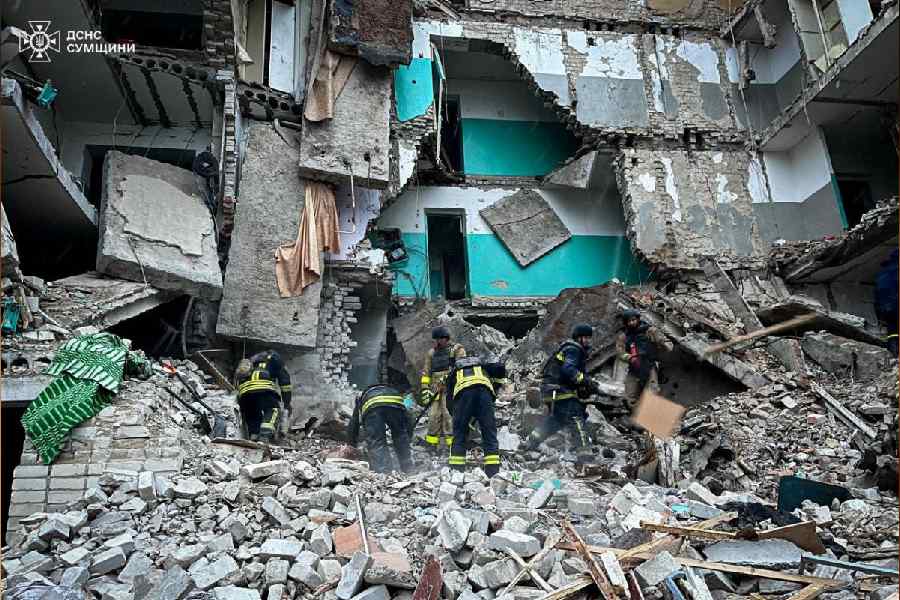 Wednesday, 20 November 2024
Wednesday, 20 November 2024
 Wednesday, 20 November 2024
Wednesday, 20 November 2024
Iran fired at least 180 ballistic missiles at Israel on October 1, 2024, amplifying tensions in the Middle East that are increasingly marked by “escalation after escalation,” as United Nations Secretary General Antonio Guterres put it.
Iran’s attacks – which Israel largely deterred with its Iron Dome missile defense system, along with help from nearby US naval destroyers – followed Israel’s killing of Hassan Nasrallah, the longtime leader of the Tehran-backed Lebanese militant group Hezbollah, on September 27.
President Masoud Pezeshkian on September 29, opposed a direct retaliation after the assassination of top Hezbollah leader Nasrallah believing that launching a preemptive strike against Israel would mean falling into a trap set by the Jewish state to start a regional war.
Alarms sounded across Israel and explosions could be heard in Jerusalem and the Jordan River Valley after Israelis piled into bomb shelters.
The Biden administration says there is a significant difference between Israeli actions that have expanded its war against the Iranian-backed militant groups Hamas and Hezbollah and Iran's retaliatory missile attack against Israel, which it condemned as escalatory.
Officials across the administration are defending the surge in attacks by Israel against Hezbollah leaders in Lebanon, while still pressing for peace and vowing retribution after Iran fired about 200 ballistic missiles at Israel on Tuesday.
President Joe Biden praised the U.S. and Israel militaries for defeating the barrage and warned, “Make no mistake, the United States is fully, fully supportive of Israel.”
Secretary of State Antony Blinken called the Iranian missile attack “totally unacceptable, and the entire world should condemn it.”
There was little criticism that Israel may have provoked Iran's assault. "Obviously, this is a significant escalation by Iran,” national security adviser Jake Sullivan said.
US Secretary of Defence Lloyd Austin spoke to his Israeli counterpart late on Tuesday, hours after Iran's missile attack on Israel following Israel's military campaign in Lebanon, and said Washington was "well-postured" to defend its interests in the Middle East.
"The Secretary (Austin) reaffirmed that the United States remains well postured to defend US personnel, allies, and partners in the face of threats from Iran and Iran-backed terrorist organizations," the Pentagon said in a statement after Austin's call with Israeli defence minister Yoav Gallant.
"The minister and I expressed mutual appreciation for the coordinated defense of Israel against nearly 200 ballistic missiles launched by Iran and committed to remain in close contact," Austin said separately in a post on X.
British Prime Minister Keir Starmer has condemned Iran’s missile attacks against Israel as he embarked on a tour to Brussels on Wednesday, where the issue will feature high on the agenda during his talks with European Union (EU) leaders.
Starmer spoke to Israeli leader Benjamin Netanyahu to express the UK’s “steadfast commitment” to Israeli security and the protection of civilians, adding that the UK stands with Israel and its “right to self-defence”.
He also made phone calls to French President Emmanuel Macron and German Chancellor Olaf Scholz to discuss the serious risk of regional escalation and the “urgent need for de-escalation, with all parties needing to show restraint”.
"I utterly condemn this attempt by the Iranian regime to harm innocent Israelis, to escalate this incredibly dangerous situation and push the region ever closer to the brink," said Starmer in a televised address from 10 Downing Street in London on Tuesday night.
"We stand with Israel, and we recognise her right to self-defence in the face of this aggression," he said.
French President Emmanuel Macron said he strongly condemns Iran's new attacks on Israel, adding that in a sign of its commitment to Israel's security it has mobilized its military resources in the Middle East on Wednesday.
Macron reiterated France's demand that Hezbollah cease its terrorist actions against Israel and its population, the French Presidency said in a statement.
Macron also wished for Lebanon's sovereignty and territorial integrity to be reinstated in strict compliance with United Nations Security Council resolutions, the presidency statement added.
Iran said early on Wednesday that its missile attack on Israel was finished barring further provocation, while Israel and the U.S. promised to retaliate against Tehran's escalation as fears of a wider war intensified.
German Chancellor Olaf Scholz on Wednesday called on Iran and Hezbollah to immediately end their attacks on Israel and warned that Iran risks inflaming the entire region.
Germany and its partners will continue to work towards a ceasefire, he added.
"Iran is risking setting the entire region on fire - this must be prevented at all costs. Hezbollah and Iran must immediately cease their attacks on Israel," he said.







